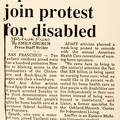San Franscisco Chronicle, Tuesday October 20, 1992
Boxed text: Top of the News. Disabled Protest. The S.F. headquarters of the Clinton-Gore campaign was blocked by dozens of protesters in wheelchairs. page A15
Title: Protesters in Wheelchairs Block Clinton Headquarters in S.F
Photo by Brant Ward/The Chronicle: Four protesters block a doorway. A woman sitting or squatting speaks with a woman in a wheelchair (Lisa Harris) who is being fanned with a poster by another woman (Sue Davis) standing behind and to the side of her. Directly behind her A man (Carl ___) stands in the doorway also blocking it.
Caption: Sue Davis fanned fellow Texan Lisa Harris as the two helped barricade the Clinton-Gore campaign headquarters at Sutter Street and Van Ness Avenue in a protest for home care for the disabled.
Article by Dan Levy, Chronicle Staff Writer:
The San Francisco headquarters of the Clinton-Gore campaign was blocked off for most of the afternoon yesterday by dozens of disabled people who staged a sit-in inside the Sutter Street building and clogged the entrance ramp with their wheelchairs.
Sensing an opportunity to take their demands for Medicaid reform to a national audience, the demonstrators pressed local Clinton-Gore officials to urge the Arkansas governor to address financing of home attendant care at yesterday's presidential debate in East Lansing, Mich.
Campaign officials tried to contact Bill Clinton and journalists on the debate panel by telephone, but they were unable to get the candidate to call the San Francisco office, said Willie Fletcher, Northern California co-director for the Clinton-Gore campaign.
But in a statement released from his national headquarters in Little Rock, Ark., Clinton said personal assistant services for disabled people “must meet the needs and desires of the user, not the dictates of the supplier."
Advocates for disabled people have argued that federal financing arrangements for delivering health care favors nursing homes at the expense oi home-based or community-based services.
The demonstration marked a second day of protests in San Francisco by American Disabled for Attendant Programs Today, a national advocacy group which timed its actions to coincide with the national convention of the American Health Care Association, which represents the nursing home industry.
How Protest Proceeded
Yesterday's protest began in the morning as a procession of more than 100 people in wheelchairs roiled up Van Ness Avenue to the Bush-Quayle campaign office at McAllister Street. Riot police prevented the demonstrators from entering the building, although police Commander Mike Brush said the facility was not wheelchair-accessible.
A larger faction of demonstrators went on to the Clinton-Gore office, where campaign officials allowed the demonstrators to occupy the building and block the front door. The campaign also paid for coffee and cake, which was served to the protesters.
Three people were detained and released during the protest, police said, and two others were cited for obstructing a doorway.
The disabled group has charged that the nursing industry takes a disproportionate share of federal health care dollars for the disabled. The group is asking that 25 percent of the $28 billion Medicaid budget be used to create a national program for home attendant care.
In California
California is one of 28 states that have established home attendant care programs through Medicaid, but advocates said Governor Wilson's order to trim the state home attendant care budget by 12 percent might result in the institutionalization of disabled people who could no longer afford to pay for home care.
Nursing homes nationwide spend an average of $25,000 to $30,000 a year for each patient, said conventioneer Karin Shirley, a nursing home administrator from Orono, Maine. A non-nurse attendant working for relatively low wages can tend to the needs of many disabled people at home, said Mike Auberger, a cofounder of the protesting disabled group.
- Author
- Dan Levy, Chronicle Staff Writer, San Franscisco Chronicle
- Created on
- Tuesday 16 July 2013
- Posted on
- Tuesday 10 September 2019
- Albums
- Visits
- 350
- Rating score
- no rate
- Rate this photo


0 comments